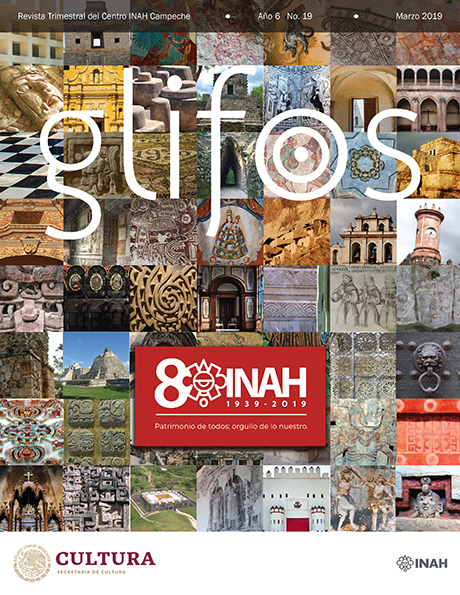Publicado 2019-03-31
Cómo citar
Los murciélagos y el inframundo maya. (2019). Glifos, 19, 6-13. https://revistas.inah.gob.mx/index.php/glifos/article/view/15299
Resumen
No se cuenta con resumen.
Descargas
Los datos de descarga todavía no están disponibles.
Referencias
1. Anónimo
s/f “Bat sculpture from Izabal or Alta Verapaz” FLAAR Mesoamerica. En línea:
www.maya-archaeology.org/...bat/
2. Cajas, Antonieta
2009 Bats in Maya art. Asociación FLAAR Mesoamérica.
3. Easby, Elizabeth K. y John F. Scott
1970 Before Cortés, sculpture of Middle America. The Metropolitan Museum of Art. New York.
4. Fash, William L.
1994 Scribes, warriors and kings: the city of Copan and the ancient Maya.
Thames & Hudson. New York.
Fash, Barbara y William Fash
1989 Copan Temple 20 and the house of bats. Seventh Palenque Round Table, IX: 61-67. Merle Greene, ed. Northern Illinois University.
5. Grube, Nikolai
2005 Toponyms, Emblem Glyphs, and the Political Geography of Southern Campeche. Anthropological Notebooks 11 (special issue: Ivan Šprajc (Hg.): Contributions to Maya Archaeology): 87-100. Ljubljana, Eslovenia. Anthropological Society.
6. Maler, Teobert
1997 Península Yucatán. Gebr. Mann Verlag. Berlín.
7. Mathews, Peter
1991 “Classic Maya emblem glyphs”. Classic Maya political history. (:19-29). Patrick Culbert, ed. Cambridge University Press. New York.
8. Mendoza-Arroyo, Gustavo Enrique y Leonel López-Toledo
2017 Inventario florístico y entomofaunístico en tres objetos de conservación ecosistémicos en las zonas núcleo de las Reservas Estatales de Balam-kú y Balam-kin, Campeche. Secretaría de Educación Pública. Instituto Tecnológico de Chiná. Informe final SNIB-CONABIO, proyecto No. JF128. México.
9. Muñoz Espinoza, María Teresa
2006 “El culto al dios murciélago en Mesoamérica”. Arqueología Mexicana, 80: 17-23. Editorial Raíces/INAH. México.
10. Pollock, Harry E. D.
1980 The Puuc. An architectural survey of the hill country of Yucatan and northern Campeche, Mexico. Memoirs of the Peabody Museum of Archaeology & Ethnology. Harvard University. Cambridge, Mass.
11. Recinos, Adrián (traducción y notas)
1971 Popol Vuh. Las antiguas historias del Quiché. Fondo de Cultura Económica. México.
12. Romero Sandoval, Roberto
2013 Zotz. El murciélago en la cultura maya. Cuadernos del Centro de Estudios Mayas, 39. UNAM. México.
13. Stephens, John L.
1963 Incidents of travel in Yucatan. 2 vols. Dover Publications Inc. New York.
14. Tokovinine, Alexandre
2002 “Divine patrons of the Maya ballgame”. Mesoweb. http://www.mesoweb.com/features/tokovinine/ballagame.pdf
15. Valencia Rivera, Rogelio y Octavio Q. Esparza Olguín
2018 “La presencia del glifo emblema del murciélago en el Petén y el sur de Campeche y sus implicaciones políticas”. Estudios de Cultura Maya, 51. México. Centro de Estudios Mayas, UNAM.
s/f “Bat sculpture from Izabal or Alta Verapaz” FLAAR Mesoamerica. En línea:
www.maya-archaeology.org/...bat/
2. Cajas, Antonieta
2009 Bats in Maya art. Asociación FLAAR Mesoamérica.
3. Easby, Elizabeth K. y John F. Scott
1970 Before Cortés, sculpture of Middle America. The Metropolitan Museum of Art. New York.
4. Fash, William L.
1994 Scribes, warriors and kings: the city of Copan and the ancient Maya.
Thames & Hudson. New York.
Fash, Barbara y William Fash
1989 Copan Temple 20 and the house of bats. Seventh Palenque Round Table, IX: 61-67. Merle Greene, ed. Northern Illinois University.
5. Grube, Nikolai
2005 Toponyms, Emblem Glyphs, and the Political Geography of Southern Campeche. Anthropological Notebooks 11 (special issue: Ivan Šprajc (Hg.): Contributions to Maya Archaeology): 87-100. Ljubljana, Eslovenia. Anthropological Society.
6. Maler, Teobert
1997 Península Yucatán. Gebr. Mann Verlag. Berlín.
7. Mathews, Peter
1991 “Classic Maya emblem glyphs”. Classic Maya political history. (:19-29). Patrick Culbert, ed. Cambridge University Press. New York.
8. Mendoza-Arroyo, Gustavo Enrique y Leonel López-Toledo
2017 Inventario florístico y entomofaunístico en tres objetos de conservación ecosistémicos en las zonas núcleo de las Reservas Estatales de Balam-kú y Balam-kin, Campeche. Secretaría de Educación Pública. Instituto Tecnológico de Chiná. Informe final SNIB-CONABIO, proyecto No. JF128. México.
9. Muñoz Espinoza, María Teresa
2006 “El culto al dios murciélago en Mesoamérica”. Arqueología Mexicana, 80: 17-23. Editorial Raíces/INAH. México.
10. Pollock, Harry E. D.
1980 The Puuc. An architectural survey of the hill country of Yucatan and northern Campeche, Mexico. Memoirs of the Peabody Museum of Archaeology & Ethnology. Harvard University. Cambridge, Mass.
11. Recinos, Adrián (traducción y notas)
1971 Popol Vuh. Las antiguas historias del Quiché. Fondo de Cultura Económica. México.
12. Romero Sandoval, Roberto
2013 Zotz. El murciélago en la cultura maya. Cuadernos del Centro de Estudios Mayas, 39. UNAM. México.
13. Stephens, John L.
1963 Incidents of travel in Yucatan. 2 vols. Dover Publications Inc. New York.
14. Tokovinine, Alexandre
2002 “Divine patrons of the Maya ballgame”. Mesoweb. http://www.mesoweb.com/features/tokovinine/ballagame.pdf
15. Valencia Rivera, Rogelio y Octavio Q. Esparza Olguín
2018 “La presencia del glifo emblema del murciélago en el Petén y el sur de Campeche y sus implicaciones políticas”. Estudios de Cultura Maya, 51. México. Centro de Estudios Mayas, UNAM.

